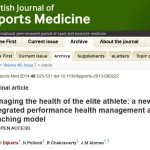LIVE FROM THE CLOSING CEREMONY!
By Team England Sports Physicians: Paul Dijkstra & Noel Pollock (@DrPaulDijkstra / @DrNoelPollock)
Tonight is the closing ceremony of what has been an amazing 20th Commonwealth Games here in Glasgow; the most successful ever for Team England who topped the medal table with just under 60 gold medals!
The Team England Medical facility was a constant hive of activity with doctors and therapists working side-by-side for very long hours to assist athletes to give their very best. The polyclinic was no exception. On our occasional visits there it was obvious that the excellent facility (sports medicine, pharmacy, 24 hour emergency care, dental, ophthalmology, radiology – including mobile MRI and CT imaging facilities) was being well utilised by all the teams; some more than others…
What were the 7 most common injuries and illnesses seen and how did we manage them?
- Upper respiratory symptoms (commonly allergy driven). Asthma and allergy are very common amongst elite athletes. More than 50% of elite athletes have hay fever and a significant percentage will have asthma (up to 25% of elite athletic teams!). Asthma and EIB are more prevalent in swimmers. Hay fever (and especially itchy and watery eyes) has been a problem here brought on by the few very hot and windy days we’ve had in the lead up to the Games. (It was close to 30 degrees on the first day of competitions here on the 24th July.)
Management Tip: Otrivine and a corticosteroid nasal spray are an excellent combination for quick control of nasal congestion and mouth breathing sleep
- Viral illness – both respiratory and gastrointestinal. Prevention and early precautionary isolation is key. Travel well-prepared with personal hand gels. Wash hands; everybody was encouraged to use the hand gel provided at the entrance to the dining hall. Paracetamol, and decongestive nasal spray. Martin Schwellnus published an excellent study in the BJSM on the effect of time zone travel on athlete risk of illness. Travelling more than 6 time zones more than doubles the risk of illness while in the foreign environment in professional rugby players.
Gastrointestinal illness is a constant threat when travelling with teams. There was some media attention to an early outbreak of Norovirus among workers here in the village before the start of the games. Due to the excellent work by the Scottish Public Health authorities and others here, the disease has not spread further. It warns us to be ready to manage this kind of problem when travelling with teams to any destination.
Management Tip: Always travel with probiotic capsules. There is some evidence that regular use will shorten the number of days of diarrhoea and also boost the immune system, particularly in endurance athletes.
- Emotional stress and sleep problems are common especially in younger athletes competing at a major event for the first time and living in a very big and busy athlete’s village environment. Athletes here are all share rooms and a few have Tweeted their frustration with the noise level!
Management Tip: Encourage athletes to minimise impact to their normal routines and to bring ear plugs and eye masks
- Chronic overuse injuries especially affecting lower limb, obviously depending on the type of sport and discipline. The most common of these are Achilles and Patella tendinopathies, plantar fasciosis and stress injuries of tibia and foot / ankle.
Management Tip: One athlete recorded a doubling of daily steps taken while in the village – encourage athletes to limit unnecessary walking and to use appropriate footwear (not flip-flops!)
- Acute muscle injuries – especially hamstring and calf muscles. These are common running injuries in sports like track and field, rugby and football.
Management tip: Most sprinting athletes will present with some hamstring symptoms through the rounds of a championships – particularly if they compete in multiple sprints/relays. Team clinicians should be experienced in the management and differentiation of hamstring presentations to assist the coaches and athletes in decision making and performance. As always know your sport!
- Acute ankle ligament injuries – especially in contact sports like rugby sevens, netball and hockey. The lateral ankle joint ligament sprains were the most commonly ligament injuries seen here.
Management Tip: Determine the severity of the injury and treat aggressively with immobilisation, cold compression, elevation, rest and strapping / taping for competition. It is important to include the athlete and coach when the relative risk of further competition is being discussed.
- Acute (and chronic) hand injuries are more common encounters by medical teams covering the boxing, judo and weightlifting events.
Management Tip: We’ve seen some excellent management of hand injuries by therapists and doctors with a combination of ice-compression, therapy, strapping, injections and anti-inflammatory medication being used.
Conclusion: The overall message is teamwork. Its an easy word to use but there are huge challenges to effective teamwork in a high performance environment (a topic for another blog!). Athletes and coaches usually benefit most when supported by doctors, therapists and management working in synergy towards a common performance goal.
Thanks to all our colleagues in Team England and to the coaches & athletes; as ever, its a privilege to work with such talented people. ————–
—————————–
